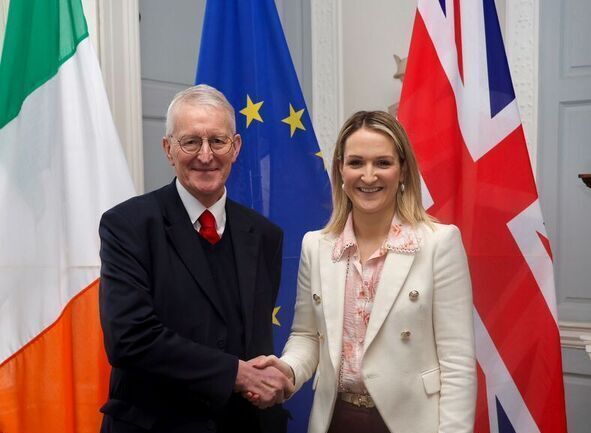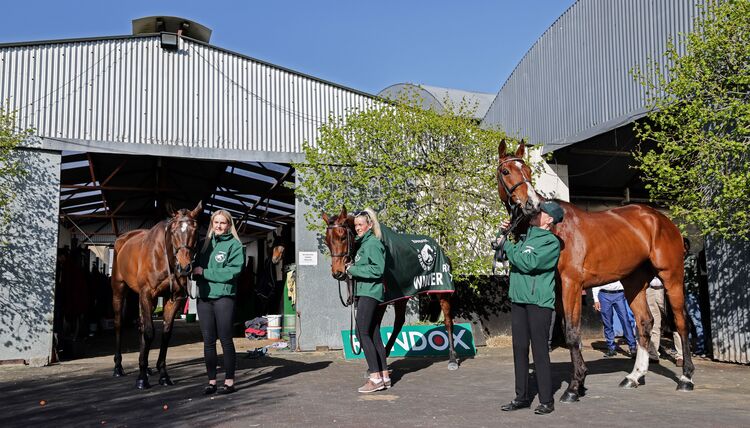Joby Fox performing with members of his band.
By Peter McDermott
“They say sarcasm is the lowest form of wit,” Joby Fox said. “But I don’t really believe it. I think you can get away with a lot of things being sarcastic.”
The West Belfast singer-songwriter was referencing his new song “Brexit Blues,” which he first performed at an international arts conference held at the Spectrum Centre on the Shankill Road and recorded eight months later in a studio in his partner Sophie’s native Denmark, where they’ve been living in lockdown.
“I took a satirical look at it,” Fox said of the song’s approach to the controversy.
It marks a return to local concerns after being an advocate with one of the highest-profile issues globally. That chapter began five years ago when, like many millions of others, he was shocked by the photo of a child’s body washed up on a Mediterranean beach. Aylan Kurdi, who was 3, had drowned during his family’s attempt to get to the Greek island of Kos, as part of a plan to reach Canada eventually.
Fox soon traveled to help pluck human beings from the Aegean Sea. “I wasn’t prepared for it. I was devastated by some of the things I’d seen,” he said of that first trip. “It was so terrible that I couldn’t walk away.
“I came back to Northern Ireland and used that little bit of profile I have,” Fox said.
It worked.
“A Belfast musician who spent two weeks in Lesbos saving desperate Syrian refugees has returned home to raise a permanent rescue team of volunteers to work full-time on the Greek island,” began a Belfast Telegraph report on Nov. 9, 2015.
It said Fox, a founder member of the Bankrobbers and Energy Orchard, had set up a new website calling on volunteers to go to the crisis-stricken island — and to raise funds for vital life-saving equipment, including a rescue boat.
"The big problem is that the smugglers on the Turkish side launch the refugees in dinghies which are totally unsuitable for that particular stretch of sea,” he told the Telegraph. “Lives are lost daily.”
Reporting on Oct. 25, 2017, that a BBC documentary about his efforts would be screened within days, Belfast Live said that he’d “brought the refugee crisis into sharp focus in Northern Ireland.”
Fox, together with fellow artist and art curator Jude Bennett, founded Refugee Rescue, and the documentary told the story of their purchase of a rigid inflatable boat, which they named “Mo Chara,” Irish for “My Friend.”
One dramatic incident was recalled from Fox’s first days on the front line: he pleaded with a man to let go of a rucksack in the sea. The volunteers had been told that refugees should be urged to prioritize their lives ahead of possessions, however few and precious they might be. It turned out, though, that the “rucksack” was the man’s giggling 2-year-old son.
“I held my arms out and grabbed the wee boy and held him close to me,” Fox said to Belfast Live. “I just cried when I was holding him. His dad was hugging me, I was hugging them both and we were all laughing and crying."
Coming from a “highly-charged political situation,” he saw something more dramatic on Greece’s sea border with Turkey. “It’s not about politics, it’s about getting them on land,” said the musician who in 2015 also opened the inaugural UN Peace Festival in Hong Kong, and the following year was musical director of the Orchestre des Refugies et Amis. “It doesn’t matter who they are. It’s a humanitarian imperative. The only identity is being human. I learnt to stay out of the politics of it all.”
Ultimately, it was politics that forced Refugee Rescue to suspend its activities last month. "We have faced a number of challenges in the past five years, but the hardline stance of the Greek authorities have made our mission impossible to pursue,” his colleague Bennett told the Belfast Telegraph.
Before Fox’s involvement with the refugee crisis (about which he penned the song “The World Is Crazy” in 2020), he had back home recorded the “End of the War” album, and was involved in projects that sought to challenge identities and ideologies in a divided society. After a while, however, he felt his peace and reconciliation work had become “a wee bit too corporate — I wasn’t seeing the impact of the work I was doing.”

The musician at the time of the release of "End of War."
He added that he was at that point “fed up with the whole music industry in general and I wanted to do something more tactile and real.”
But even on Lesbos, he couldn’t escape the issue of identity. A woman suggested that he must be a Muslim because he’d helped her. The more he insisted he wasn’t the more she said he was.
“I think religion is divisive,” Fox said.
Denmark’s government has issues, he added, around second- and third-generation Arabs not assimilating into the broader culture. He recalled working in a studio in what Danes call “the ghetto” — a majority Arab district. “It reminded me of the Lower Falls during the Troubles,” he said. “The vibe.”
Because of his natural sympathy for secularism, the issue of assimilation or lack thereof “challenged” him. “I struggled with it,” he said.
“You can see different points of view. You can see the Danish point of view and you can see the Arab community’s point of view,” Fox said. His partner Sophie was sympathetic to the position that “the government was too hard on these guys.”
He can see how Arabs might see any objection to them as religious in a country that has traditionally had a majority Christian ethos rather than as an issue of the rule of law.
“It creates great difficulties,” Fox said. “It’s something I’m very interested in.
“My whole life has been about stripping away identity, the things I was given or had appropriated over the years to feel comfortable as part of a group, to identify with something because it made me feel safe, to feel part of a community and all of that,” he said.
If “Imagine” seems the utopia that Fox is pursuing, then it’s no surprise, as John Lennon is the beginning and the end as far as he’s concerned.
The Beatle would’ve turned 80 last Friday and the time since his hero’s death are the same 40 years Fox has been in the business.
That story began with the Bankrobbers, when the musician was 17, and an interesting one it is, with an EMI record deal in London and some adventures along the way. But in time the band was dropped by the company. Next up was Energy Orchard, formed in 1988 with the late Bap Kennedy. It put Fox back in the music scene in London and the band toured extensively in Europe and the U.S. After three years, citing a lack of serious creative engagement within Energy Orchard, he left the band he’d “given my all to.” There would be many other episodes and twists and turns in his career, including learning new skills in sound, writing more songs, dabbling in the electronic genre and working with artists like Steve Earle.
Energy Orchard’s first hit was Fox’s “Belfast,” which he has sung at the New York-New Belfast conference. He’s a fan of the Big Apple for reasons other than it being Lennon’s adopted home. And he loves upstate too, with Woodstock being a favorite place.

Joby Fox on Bleecker Street, New York City.
Belfast is not far away from his heart either, and he jumped at the opportunity to perform at the Spectrum in recent times. It had long been an ambition to perform on the Shankill Road, one motivated at least in part by his peace and reconciliation perspective, having grown up on the Falls Road.
Brexit and its relationship to arts and artists was up for discussion at the conference and he was given 12 hours to write the song.
“I love a challenge,” he said.
Fox who labels his own music as “contemporary” and “jazzy folk pop,” with “storytelling in there like a typical Irishman,” recorded “Brexit Blues” with some young Danish jazz musicians.
The song gives voice to the frustrations of the Irish and Scottish parts of the UK, greatly outnumbered by the pro-Brexit English. Fox said Northern Ireland only gets a say at Westminster “when the unionists have the balance of power and are kingmakers for a day.”
The issue is followed in Denmark, which joined the then EEC on the same day as the UK and Ireland in 1973. “They think Boris Johnson is a nincompoop,” Fox said. “They understand it [Brexit] a lot. They probably don’t get the nuances of it, but they get the fundamental dynamics.”
The singer-songwriter said he enjoys contributing to the “discourse and having a bit of fun with it as well.”
Fox said, “I do have a chuckle at the song myself.”
To listen to and download “Brexit Blues,” go to jobyfox.com.









